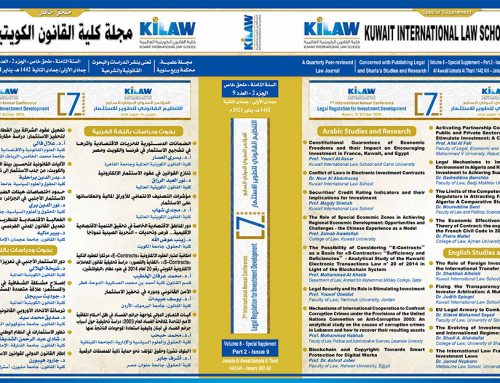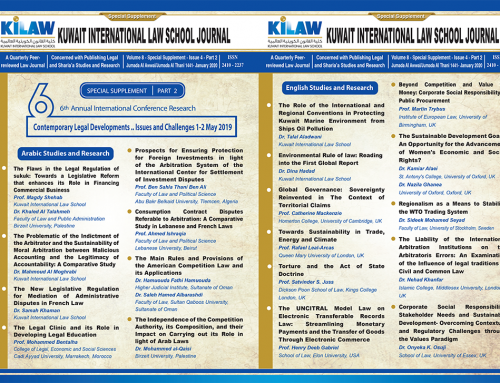Editor-in-Chief Prof. Badria A. Al-Awadi
The judiciary is a fair, independent and fundamental pillar of the legal system, guaranteeing rights and freedoms as well as social and economic life aspects. The activation of the judiciary’s positive role requires the judge’s strong conviction in the importance of their role, as well as initiatives and continuous efforts in order to create well-established and stable trends that are respected and applied by courts and other constitutional authorities, especially in legal and democratic States.
In this context, a recent ruling of the Constitutional Court of Kuwait issued on October 24, 2018 in case No. (1) of 2018 / constitutional, is a vivid example of the effective role of the judiciary in the protection and promotion of legal guarantees. The court ruled for the unconstitutionality of Article (42) of law no. 106 / 2013 concerning the anti-money laundering and the financing of terrorism, considering that: “The text alleged to be unconstitutional prevents the judge from using his discretionary power in refraining from pronouncing the sentence or suspending the execution of the penalty; it has thus undermined the essence of the judicial function in regards to the offense under the criminal proceedings by denying the discretionary power of the judge and depriving him/her of the right to assess the penalty. Therefore, this text is considered a disruption of the litigation system, and a waste of the right of the accused of a fair trial in regards to the imposition of the penalty. It also constitutes a prohibited interference from the legislative authority in the affairs of the judiciary and a disregard of its independence … “. The court added that the application of this article violates the state’s submission to the law and denies the right of clemency in violation of articles (32), (33), (34) and (50) of the Constitution.
At the international level, the decision of the European Court of Human Rights of 25/10/2018 constitutes a basic guarantee for the protection of religious beliefs, arguing that the abuse of the Prophet Muhammad may not be considered an act of freedom of expression. This issue was raised during the hearing of an appeal against a conviction of an Austrian woman who had repeatedly attacked the Prophet (PBUH), issued by an Austrian court. The European Court of Human Rights upheld the Austrian court’s position, noting that it “thoroughly assessed the petitioner’s statements and carefully balanced her right to freedom of expression with the right of others to have their religious feelings protected, as well as the legitimate aim of providing religious peace in Austria” (Euro News).
These provisions are examples of the hundreds of other rulings issued around the world every day that reflect the positive role of the judiciary in promoting legal guarantees for the challenges faced by contemporary societies. The rigidity and vagueness of legal texts and their lack of existence at other times, as well as the complexities of many emerging issues, requires an innovative and creative role for the judiciary, both judges and magistrates and the public prosecution, in devising solutions and judicial decisions that enhance the legal guarantees of both the individual and the social entity and encourage the spirit of initiative, participation and comprehensive community renaissance.





